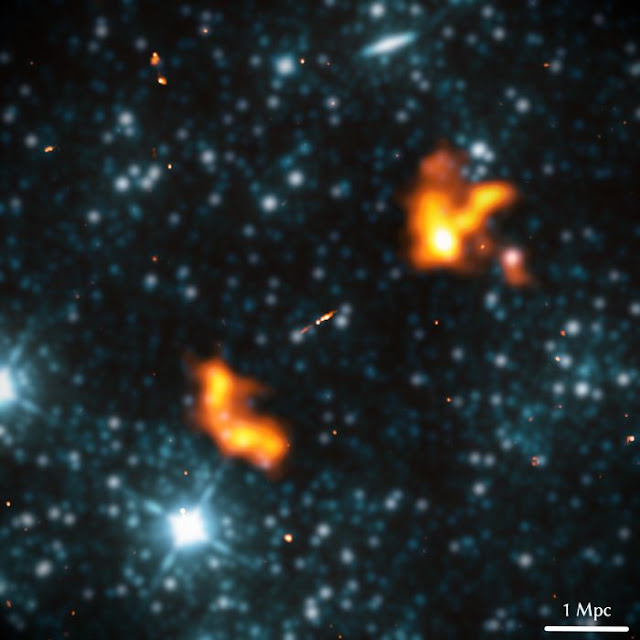Astronomers have discovered a gargantuan galaxy. Alcyoneus is a massive radio galaxy 3 billion light-years away that extend 5 megaparsecs into space.
 |
| The radio lobes of Alcyoneus. (Oei et al., arXiv, 2022) |
The revelation demonstrates our lack of understanding of these colossi and what causes their phenomenal development. However, it may pave the way to a deeper knowledge of not only massive radio galaxies but also the intergalactic medium that floats in the vast gaps of space.
Giant radio galaxies are just one more enigma in a Universe full of mysteries. They are made up of a host galaxy (a cluster of stars around a galactic nucleus containing a supermassive black hole) and huge jets and lobes that erupt from the galactic core. When these jets and lobes contact the intergalactic medium, they operate as a synchrotron, accelerating electrons that emit radio emissions.
 |
| Three images of the largest galaxy ever discovered by astronomers in infrared, radio, and optical wavelengths. The galaxy in question Alcyoneus, spans a whopping 16.3 million light years. MARTIJN SIMON SOEN LIONG OEI/LOFAR Astronomers found Alcyoneus after processing the data collected by the LOw Frequency ARray (LOFAR) in Europe. The astronomers, responsible for this discovery, wrote: "We have discovered what is in projection the largest known structure made by a single galaxy – a giant radio galaxy with a projected proper length [of] 4.99 ± 0.04 megaparsecs. The true proper length is at least … 5.04 ± 0.05 megaparsecs," Astronomers believe that Alcyoneus is still growing even bigger, far away in the cosmic dark. The research has been accepted for publication in Astronomy & Astrophysics, and is available on arXiv. You can read more about this discovery here. |



No comments:
Post a Comment